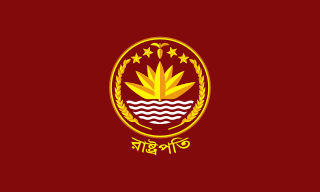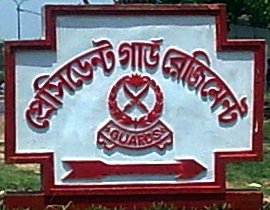
The Bangladesh Nationalist Party is one of the two major contemporary political parties of Bangladesh. It was founded on 1 September 1978 by former Bangladesh President Ziaur Rahman after the Presidential election of 1978, with a view to uniting the people with nationalist ideology of the country. Since then, the BNP won the second, fifth, sixth and eighth national elections and two Presidential elections in 1978 and 1981. The party also holds the record of being the largest opposition in the history of parliamentary elections of the country, with 116 seats in the seventh national election of June 1996. It does not currently have representation in parliament after its boycotting of the 2014 national election.

The President of Bangladesh is the Head of State of Bangladesh.
Shah Azizur Rahman was a Bangladeshi politician who served as the Prime Minister of Bangladesh. However, he was the subject of considerable controversy for his collaboration with the Pakistan Army against the struggle to establish Bangladesh.
Bangladesh has undergone several changes of government since its independence.

Chandrima Uddan or Chandrima Udyan also, Zia Uddan is a park situated across the road of the national parliament house, in Dhaka, Bangladesh.
Lieutenant Colonel Syed Faruque Rahman was the 2IC of 1st Bengal Lancers Regiment of Bangladesh Army He was the chief organiser of the assassination of Sheikh Mujibur Rahman, the founding President of Bangladesh on 15 August 1975. Rahman led a group of junior army officers who overthrew Sheikh Mujib's regime and installed Khondaker Mushtaque Ahmed as president.

The Jatiya Samajtantrik Dal is a political party in Bangladesh.

Mohammad Ziaur Rahman is a first-class and List A cricketer from Bangladesh. He is a right-handed batsman and right arm fast medium bowler. Sometimes referred to on scoresheets by his nickname Joni, he made his debut for Khulna Division in 2004/05 and played through the 2006/07 season. He also appeared for Bangladesh Under-19s in 2003/04 and the Bangladesh Cricket Board President's XI and Bangladesh Cricket Board Academy in 2006/07. He is known as the "Hit man" of Bangladesh cricket team. In Bangladesh Cricket League 2012, he scored unbeaten 152 off 118 balls vs South Zone, where he smashed 15 sixes. Highest by any Bangladeshi player in any cricket format. Ziaur is also known for hitting sixes in every games.
1981 (MCMLXXXI) was a common year starting on Thursday of the Gregorian calendar, the 1981st year of the Common Era (CE) and Anno Domini (AD) designations, the 981st year of the 2nd millennium, the 81st year of the 20th century, and the 2nd year of the 1980s decade.

The President Guard Regiment (PGR) is a military unit under the Executive Office of the President of Bangladesh. It is located at Banga Bhaban and Gono Bhaban. It provides military support for all security functions; including presidential travel, general medical support, emergency medical services, and hospitality services. The PGR is headed by the Military Secretary to the President and the Commander, President Guard Regiment. The regiment was created by President Ziaur Rahman in 1976. It was originally designated as the Presidential Security Force. The PSF was restructured and upgraded to full regimental status by President Hussain Muhammad Ershad in 1982 and the new title of President Guard Regiment was adopted. The current PGR Commandant is Brig Gen Md Jahangir Harun.

Shaheed Ziaur Rahman Medical College is a government medical school in Bangladesh, established in 1992. It is located in Bogra town. It is affiliated with the University of Rajshahi.
Bangladeshi nationalism is an ideology propagated by former Bangladesh President Ziaur Rahman. The ideology emerged during the late 1970s and is the institutional basis of Bangladesh Nationalist Party, one of the leading political parties of Bangladesh.
Ziaur Rahman (1936–1981) was the President of Bangladesh from 1976 until 1981.
The 1982 Bangladeshi military coup d'état deposed the civilian government headed by the president of Bangladesh Abdus Sattar and brought to power the Chief of Army Staff of the Bangladesh Army Lt. Gen. Hussain Muhammad Ershad. After serving initially as the Chief Martial Law Administrator, Ershad assumed the post of president in 1983 and ruled until 1990.

Presidential elections were held in Bangladesh on 3 June 1978. They were the first direct elections for the post President, as the post had previously been elected by the Jatiya Sangsad. The result was a victory for Ziaur Rahman, who won 76.6% of the vote. Turnout was 54.3%.
Presidential elections were held in Bangladesh on 15 November 1981. The result was a victory for the incumbent acting President Abdus Sattar of the Bangladesh Nationalist Party (BNP), who received 65.5% of the vote, beating his principal challenger Kamal Hossain of the Awami League. Voter turnout was 54.3%.
Mashiur Rahman (1924–1979), also known as Jadu Mia, was a senior minister, with the rank and status of a prime minister in charge of the ministry of Railways, Roads and Highways of the Bangladesh from 29 June 1978 to 12 March 1979.
The 7 November 1975 Bangladesh coup d'état was a coup d'état launched by left wing army personnel in collaboration with left-wing politicians from Jatiya Samajtantrik Dal. The coup killed Khaled Mosharraf who had removed those involved in the Assassination of Sheikh Mujibur Rahman from power. The coup also freed Ziaur Rahman from house arrest and allowed him to eventually seize power and become president.















